Potato starch is a popular ingredient in many recipes, from pancakes and noodles to gravies and soups.
It adds a unique texture and helps the mixture bind together better than other starches.
But what if you don’t have potato starch in your kitchen cupboard?
What are the best substitutes for potato starch?
The best substitutes for potato starch include arrowroot powder, cornstarch, tapioca flour/starch, and rice flour. You can also use mashed potatoes, breadcrumbs, or oat flour as binding ingredients instead of using potato starch.
If you need an alternative to potato starch that is vegan-friendly or gluten-free, then look no further! We’ve got all the answers right here!
Let’s explore the 12 very best alternatives for potato starch and how to use them.
What Is Potato Starch?
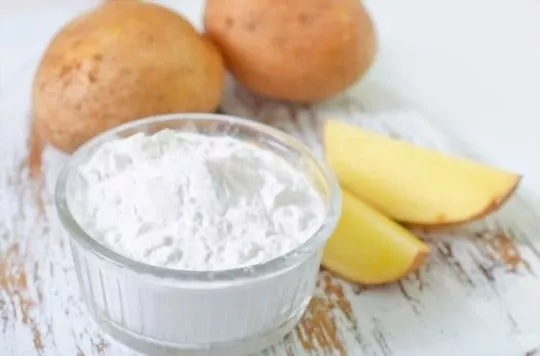
Potato starch is a white, powdery substance that is extracted from potatoes.
It is a fine and odorless powder that is commonly used as a thickening agent in cooking and baking.
Potato starch is also used as a gluten-free alternative to wheat flour in many recipes.
Potato starch is made by washing and grinding potatoes to remove the starch granules.
The starch is then extracted from the potato pulp using water and centrifugation.
The resulting starch is then dried and milled into a fine powder.
Potato starch is high in carbohydrates and low in protein and fat.
It is also gluten-free and has a neutral taste, which makes it a versatile ingredient in many recipes.
Potato starch is commonly used to thicken soups, sauces, and gravies, as well as to make gluten-free baked goods.
Here is a table comparing potato starch to other common starches:
| Starch | Calories per 100g | Carbohydrates per 100g |
|---|---|---|
| Potato Starch | 341 | 83g |
| Cornstarch | 381 | 91g |
| Tapioca Starch | 360 | 88g |
| Arrowroot Powder | 338 | 84g |
| Wheat Flour | 364 | 76g |
It is important to note that while potato starch is a popular ingredient, it may not be suitable for everyone.
Some people may have allergies or sensitivities to potatoes, and should avoid using potato starch in their cooking.
Additionally, potato starch is high in carbohydrates, which may not be suitable for people on low-carb diets.
The 12 Best Substitutes For Potato Starch
Potato starch is a great ingredient to use in baking, but it can be hard to find.
Fortunately, there are several substitutes that will provide the same results. Here are twelve alternatives to potato starch that you can use in your cooking and baking recipes:
1 – Tapioca Starch

Tapioca starch, also known as cassava flour, is a gluten-free and highly versatile ingredient that can replace potato starch in many recipes.
It is made from the root of the cassava plant and has a neutral flavor, making it suitable for use in both savory and sweet dishes.
In terms of texture, tapioca starch is more powdery than potato starch; however, it can be used in place of potato starch to thicken sauces and soups.
Because tapioca starch absorbs liquid quickly, often half the amount is required compared to potato starch when used as a thickener.
As such, it is an excellent substitute for those looking to reduce their carbohydrate intake or avoid starchy ingredients.
2 – Arrowroot Powder

Arrowroot powder is another great substitute for potato starch that offers culinary versatility and health benefits.
It is made from the subtropical Arrowroot plant which produces a starchy white powder when dried and processed.
Much like tapioca starch, arrowroot powder is gluten-free, mild flavored, and can be used in place of potato starch as a thickening agent without changing the consistency or overall flavor of your dish.
Plus, because arrowroot powder has fewer carbohydrates than potato starch and tapioca flour combined with its low glycemic index, it makes an ideal ingredient for those following a keto diet or looking to reduce their carb intake.
3 – Coconut Flour

Coconut flour is an excellent grain-free alternative to traditional flours with added health benefits such as high levels of iron and dietary fiber.
Not only does coconut flour add structure to baked goods but also provides a light fluffy texture while imparting subtle sweetness when added in small amounts.
As with other substitutes mentioned previously, coconut flour can replace potato starch when used as a thickening agent although it will require more liquid due to its higher absorbency rate compared to potato starches.
So if you’re looking for a tasty option that’s easy on your digestive system then consider using coconut flour instead of potato starches for your next culinary creation!
4 – Wheat Flour
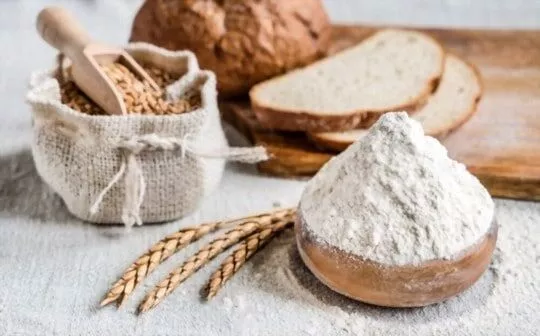
Wheat flour is a popular, widely available alternative to potato starch.
It is made from the finely ground endosperm of wheat grain and can be used in baking or thickening sauces and gravies. It offers a mild flavor and creamy texture that works well in most recipes.
To substitute for potato starch, use ¼ cup of wheat flour for every 1 cup of potato starch.
Wheat flour also contains more gluten than potato starch, so it’s important to note that this substitution may create a denser texture in your end products.
5 – Cornstarch
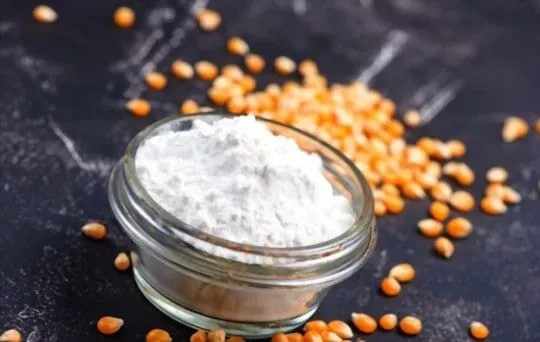
Cornstarch, like potato starch, is derived from grains and provides an all-natural alternative to conventional thickeners.
It is made from corn kernels through a milling process, yielding a fine white powder with low-fat content and natural sweetness.
Cornstarch can be used as an effective substitute for potato starch when baking or cooking various dishes.
To do so, use double the amount of cornstarch as you would use potato starch—for instance, if the recipe calls for one cup of potato starch, you would use two cups of cornstarch instead.
6 – Rice Flour

Rice flour is another excellent choice for those looking for a natural substitute for potato starch.
This white powdery substance is made by grinding raw rice into a fine powder that’s perfect for baking goods and thickening sauces and gravies alike.
Rice flour provides a unique flavor profile compared to other starches or flours, while its light consistency ensures your recipes won’t become overly dense or heavy upon cooking or baking them.
To replace one cup of potato starch with rice flour, use ¾ cup of rice flour instead—this ratio minimizes any potential texture issues while ensuring your results are consistent with the recipe’s original intent.
7 – Cassava Flour

For those looking for a gluten-free starch substitute, cassava flour is an ideal option.
Derived from the cassava root, this grain-free flour is packed with vitamins and minerals, including vitamin C, calcium, and iron.
It has a slightly sweet flavor and light texture, making it perfect for baking or thickening soups.
As a replacement for potato starch, cassava flour provides similar qualities in terms of texture and binding ability.
When using this substitute, bear in mind that it has different moisture retention properties than potato starch; as such, it’s best to adjust your recipes accordingly.
With its unique flavor profile and nutrient-dense composition, cassava flour is an excellent choice when seeking a healthier alternative to potato starch.
8 – Sweet Potato Flour
Sweet potato flour is gaining popularity among health enthusiasts due to its impressive nutrition profile.
Made from ground sweet potatoes with the peel intact, this flour offers ample amounts of dietary fiber, potassium, beta carotene and B vitamins.
Compared to regular potato starch, sweet potato flour imparts a sweeter flavor and more vibrant color to your dishes.
Similar to other starches, sweet potato flour can be used as a thickener for sauces or gravies that require a smooth consistency.
Plus, its healthy ingredients make it a great choice for those seeking an extra nutritional boost in their cooking routine.
9 – Chickpea Flour
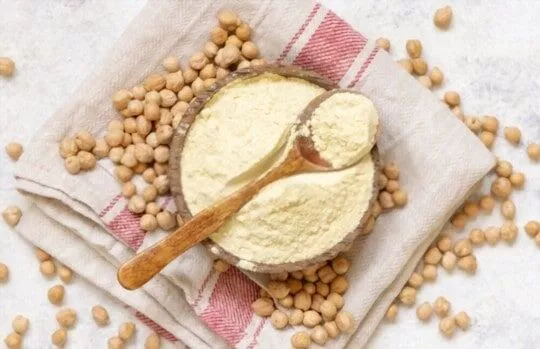
Chickpea flour is quickly becoming one of the most popular gluten-free substitutes on the market due to its versatile nature and high protein content.
This nutty-tasting flour can be used in many applications beyond just baking — think veggie burgers or falafel — lending itself well to both savory and sweet recipes alike.
As an alternative to potato starch, chickpea flour works wonders as a thickener while providing additional nutrients like magnesium and zinc simultaneously.
Its earthy undertones add an extra layer of flavor which can really bring out the best in your dishes!
10 – Almond Flour
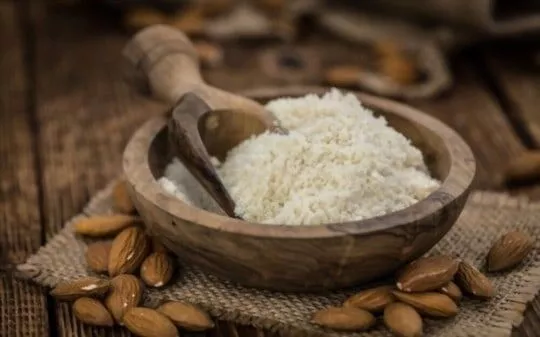
Almond flour is a nutrient-rich, gluten-free alternative to traditional wheat flours and is perfect for baking.
Ground from blanched almonds, this light and fluffy ingredient can be used to thicken sauces, bind an array of dishes, or as an alternative to potato starch.
As a potato starch substitute, almond flour adds a pleasant nutty flavor to your culinary creations while providing additional fiber and protein.
It has a slightly sweet taste that pairs well with both savory and sweet recipes alike.
For best results, reduce the amount of liquid in your recipe by 1/4 cup for every cup of almond flour used in order to achieve the desired consistency.
11 – Oat Flour
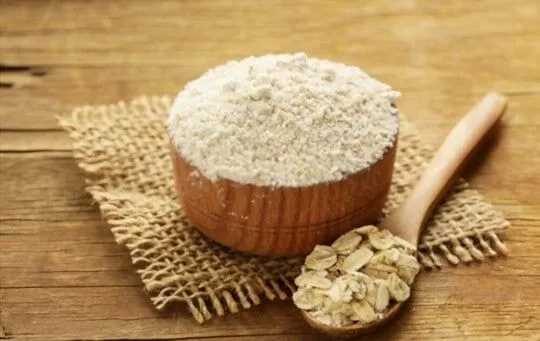
Oat flour is made from finely ground oats, resulting in a fine texture that lends itself beautifully to various baked goods.
This versatile ingredient can replace wheat flour or cornstarch at 1:1 ratios and is ideal for those avoiding grains or looking for an alternative to potato starch.
Although oat flour lacks the binding power of potato starch, it provides an abundance of dietary fiber while offering a delightful nutty flavor to your baked delicacies.
To maximize its potential as a potato starch substitute, combine oat flour with an equal measure of arrowroot powder or tapioca starch for maximum thickening power in your dishes.
12 – Soy Flour

Soy flour is derived from ground whole soybeans and offers numerous benefits such as enhanced flavor, improved texture, and additional protein compared to other flours.
It can be used in place of wheat flour at a 1:1 ratio but works best when blended with other flours such as rice or chickpea.
When combined with water it creates a slurry that acts similarly to cornstarch or potato starch as a natural thickener for sauces and gravies.
As this type of flour cooks faster than regular wheat flours, keep an eye on your dishes during cooking time to avoid over-browning them due to the high heat required when working with soy flour alone.
Frequently Asked Questions (FAQs)
- Can I replace potato starch with cornstarch? Yes, you can replace potato starch with cornstarch in most recipes. However, keep in mind that cornstarch has a stronger thickening power than potato starch, so you may need to adjust the amount used.
- Can I use plain flour instead of potato starch? Yes, you can use plain flour instead of potato starch, but keep in mind that flour has a different texture and taste than potato starch. Additionally, flour contains gluten, which may not be suitable for people on a gluten-free diet.
- What’s the difference between potato starch and cornstarch? The main difference between potato starch and cornstarch is their origin. Potato starch is extracted from potatoes, while cornstarch is extracted from corn. Additionally, cornstarch has a stronger thickening power than potato starch and is often used in larger quantities.
- What is the English equivalent of potato starch? Potato starch is the English name for the ingredient. There is no other commonly used name for it in English.
Conclusion
In conclusion, potato starch is a versatile ingredient that is commonly used as a thickening agent in cooking and baking.
However, if you are unable to find potato starch or have a sensitivity to potatoes, there are several common replacements that can be used in its place, such as cornstarch, tapioca starch, arrowroot powder, and wheat flour.
It is important to note that each replacement has its own unique properties and may require adjustments to the recipe.
By keeping these common replacements in mind, you can easily substitute potato starch in your favorite recipes and still achieve the desired results.
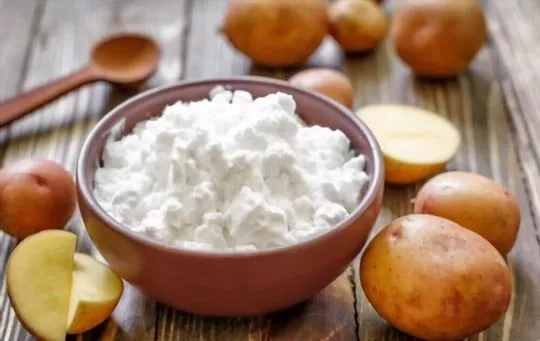
The 12 Best Substitutes For Potato Starch
Ingredients
- Tapioca Starch
- Arrowroot Powder
- Coconut Flour
- Wheat Flour
- Cornstarch
- Rice Flour
- Cassava Flour
- Sweet Potato Flour
- Chickpea Flour
- Almond Flour
- Oat Flour
- Soy Flour
Instructions
- Pick your favorite substitute from the list above.
- Follow cooking directions for your selected substitute with the proper ratio of ingredients.
Jenny has always been passionate about cooking, and she uses her platform to share her joy of food with others. Her recipes are easy to follow, and she loves giving tips and tricks to help others create their own unique culinary creations.

